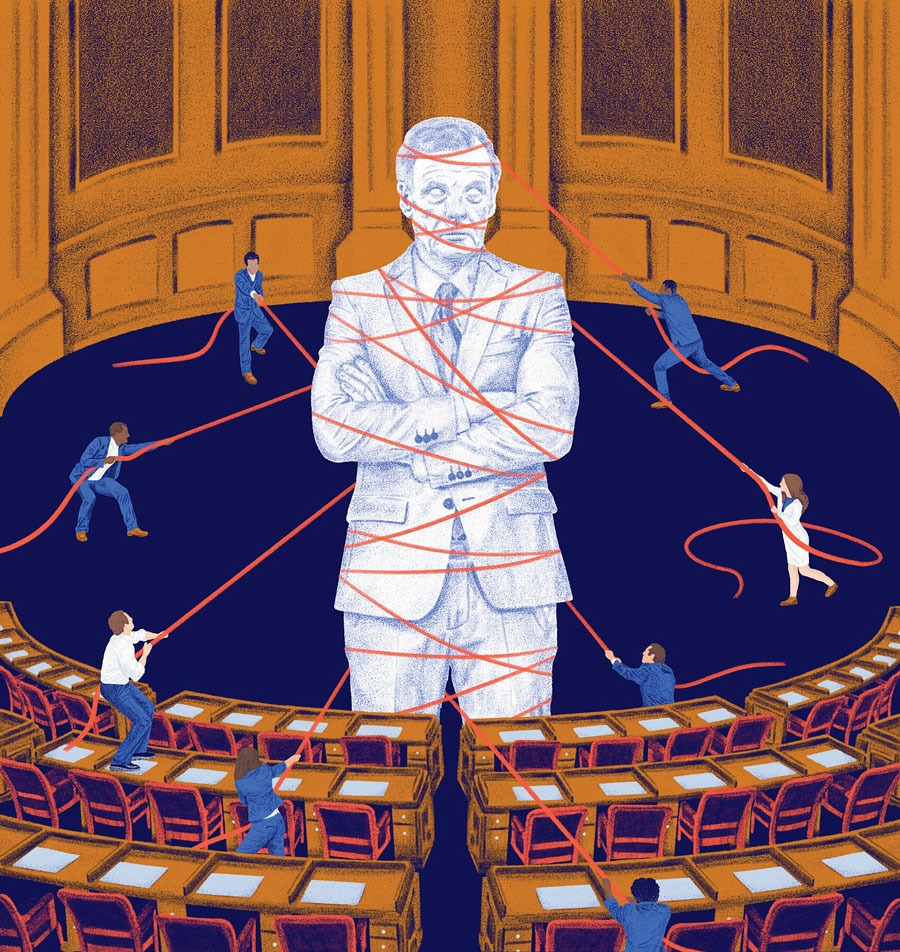When Michael Madigan was elected chairman of the Illinois Democrats in 1998, the party’s two-seat majority in the state House of Representatives was its lone source of power. Republicans controlled the governorship, all the statewide offices, and the state Senate. The congressional delegation was tied, 10 to 10. Today, the Democrats have it all, dominating the state more thoroughly than at any time since before the Civil War, when the Republican Party didn’t exist.
Much of that dominance is due to political trends that have transformed Illinois from a swing state to a blue state. But Madigan’s ruthless yen for power deserves some credit, too. The recently ousted House speaker’s legendary 2011 gerrymander, which led to supermajorities in both houses of the legislature, “punched his ticket to the partisan hall of fame,” according to Politico.
A hall of fame, though, is for retired players. More and more of Madigan’s fellow Democrats — including Governor J.B. Pritzker, Senators Dick Durbin and Tammy Duckworth, and U.S. representative Robin Kelly — believe it’s time for him to step down from the party chairmanship, even though his term runs until 2022. They say his ethical issues, especially the ComEd bribery scandal, have cost the party House seats and helped sink the so-called Fair Tax. “Every day that Madigan remains chairman is another day we are focused on Madigan’s controversies instead of our critical electoral contests,” Cook County clerk of the circuit court Iris Martinez said last year.
Madigan’s critics also say his door-to-door campaign methods, which he learned as a ward committeeman in Mayor Richard J. Daley’s Cook County Democratic machine, are anachronistic in an era of text messages and social media. Until recently, the 78-year-old Madigan did not use a cellphone. He raised money for the party and his daughter Lisa’s attorney general campaigns through a “friends of family” program, which consisted of asking politicos and lobbyists for their Christmas card lists. As 13th Ward committeeman, he dispatched his loyal precinct captains (a.k.a. the Madigoons) to knock on doors for Democrats in suburban swing districts.
“I haven’t seen a lot of investment in new technology as well as new ways of doing campaigns,” says 19-year-old wunderkind political staffer Eli Stone, who ran the peer-to-peer texting program of Mayor Lori Lightfoot’s campaign, recruiting more than 100 volunteers and writing scripts for them to text to voters from their personal accounts. Stone, who was born four years after Madigan became chairman, would like to see the party adopt a similar strategy. (Already in the digital era is Pritzker, who targeted voters with Spotify ads.) Even the party’s efforts to embrace technology are clumsy. On the front page of its website: a large photo of Madigan at a St. Patrick’s Day parade, above the legend “The Chairman’s Record.” The party’s Twitter feed, @demsforillinois, has only 3,300 followers, less than a fifth of @ILGOP.
SOCIAL MEDIA SMACKDOWN!
Sizing up which party rules the state’s digital scene
The Illinois Republicans know
a TikTok from a WhatsApp.
When Stone worked for former state representative Yoni Pizer, the campaign didn’t take the party’s money, because that was seen as taking Madigan’s money. To voters, the chairman is the party. When Stone knocked on doors for Representative Bob Morgan, a Democrat from Highwood, “the No. 1 thing I heard was, ‘Does he support the speaker?’ ” (Morgan was one of 19 representatives who declared he would not vote for Madigan as speaker, helping to end his 36-year run in the office.)
As party chairman, Madigan has made protecting the Democrats’ House majority his top goal, says former state representative John Fritchey, who served in Madigan’s House from 1997 to 2011. Madigan is a master at raising money from Democratic special interest groups, such as unions and trial lawyers, and funneling it to his members. Rich Miller wrote on the Capitol Fax blog that “Madigan mainly used the Democratic Party of Illinois as a postage discount machine for his House campaigns. The chairmanship saved the Dems hundreds of thousands of dollars per cycle in postage costs,” because state parties are allowed to mail literature at nonprofit rates. That focus on the House has prevented the party from investing in local races to build a “farm team,” and from demonstrating to voters that the Democrats stand for something beyond winning elections.
“It’s tough to look at the Democratic Party of Illinois as truly a statewide apparatus,” Fritchey says. “It could have been aptly renamed the Democratic House Majority Committee. The party should not solely be a political apparatus. It should be a clearinghouse of events, information, and seminars to motivate voters and let them know what the party is about.”
State representative Will Guzzardi, who also participated in the revolt against Madigan, does not expect him to remain as party chairman now that he’s lost the speakership: “It’s difficult for me to imagine him performing some of those roles and not all of them.” The party’s success over the past two decades, though, means it no longer needs Madigan. Now that Democrats dominate the suburbs, Fritchey says, “gerrymandering is not as important as it used to be.” With Democrats controlling all levers of power in Springfield, “funders aren’t going to go away,” Stone says. “Unions aren’t going to stop supporting Democrats.”
Madigan is a victim of his own success in other ways, too. Most of the representatives who revolted against his speakership are from suburban districts that he helped flip from Republican to Democratic but that can’t abide his Chicago-style political tactics. Madigan has run the Illinois Democratic Party like a machine boss, but the machine has had its day in Illinois, and so has he.




Comments are closed.